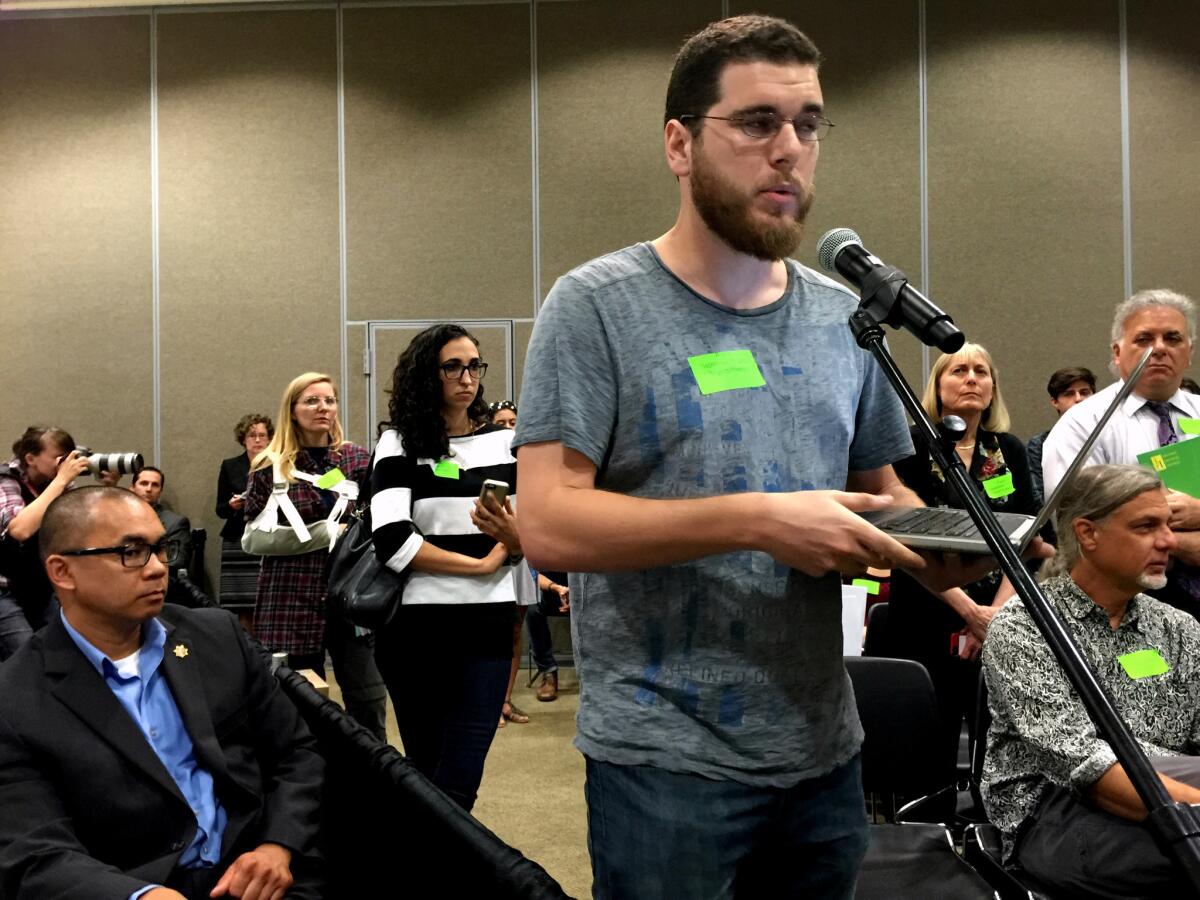Op-Ed: Can UC devise a hate-speech policy that’s also 1st Amendment friendly?

A UC Santa Barbara alumnus addresses members of the Board of Regents during a Sept. 17 meeting at UC Irvine regarding a controversial policy statement on intolerance.
The challenges are enormous, if not insurmountable, as the regents of the University of California seek to develop a hate-speech policy on campuses. Recent anti-Semitic incidents spurred the regents to want to take action, but at their Sept. 17 meeting, they chose not to adopt proposed “principles against intolerance.” Instead, they created a committee to consider the issue anew. The reality, however, is that the chance of a breakthrough is low.
Any written policy would need to achieve conflicting goals: expressing a strong commitment to freedom of speech as an integral aspect of education, while seeking to prevent speech that is racist, sexist, anti-Semitic or homophobic. The trick is in setting the border between heated, even inflammatory, speech and hate speech, which is notoriously difficult.
The Supreme Court long has held that vague speech rules violate the 1st Amendment and deny due process of law. In fact, efforts at defining hate speech by other state universities have been declared unconstitutional on vagueness grounds.
The University of Michigan, for example, adopted a code in the 1980s — later struck down by the Supreme Court — that prohibited “any behavior, verbal or physical, that stigmatizes or victimizes an individual on the basis of race, ethnicity, religion, sex, sexual orientation, creed, national origin, ancestry, age, marital status, handicap or Vietnam-era veteran status.”
But what does it mean to “stigmatize” or “victimize”? If a professor or student agues that there are inherent differences between men and women, does that violate the policy? Can advocacy of affirmative action be deemed to violate this policy because it stigmatizes racial minorities by assuming that they need preferential treatment to compete?
Along with principles of intolerance, activists on UC campuses are urging the Board of Regents to adopt the State Department definition of anti-Semitism, which includes trying to “demonize Israel,” “delegitimize Israel” or applying a “double-standard to Israel.” But who is fit to judge when criticism of Israel’s policies and actions veers into demonization? If a student states that Palestinians should have a right of return, is she seeking to delegitimize Israel or just airing a controversial opinion? What if she says the country’s founding was a mistake?
Under the 1st Amendment, there is no such thing as a false idea and all viewpoints may be expressed. The 1st Amendment even protects the right to deny the Holocaust or advocate the subjugation of a supposedly inferior group. There unquestionably is a 1st Amendment right to argue against (or for) the existence of Israel or to contend that it should meet (or not have to meet) higher standards of human rights than other nations.
These difficulties have led some campuses to take a softer approach: adopting community speech guidelines or principles, while pledging not to punish those who violate those principles. Campus administrators can feel that they are taking positive actions without fearing constitutional challenges. Also, they can remind students that just because there is a 1st Amendment right to say something, that doesn’t mean it should be said.
But such middleground policies always seem to leave everyone dissatisfied. Those who want to prevent hate speech see them as toothless or ineffectual because they cannot be enforced. Those who are most concerned about protecting freedom of expression on campus still worry that they will chill speech and inhibit discussion.
Is there a solution to all of this? Is there anything the regents committee and other universities can try?
My advice would be to draft a policy that focuses on reaffirming the importance of free expression while defining what is not constitutionally protected. There is no 1st Amendment right to threaten or harass another person or to deface someone else’s property.
The policy should not seek to inhibit or limit protected speech, no matter how offensive it might be. The policy should seek to define, with as much precision as possible, what types of speech and conduct cross the line and are impermissible.
We should also remember that universities have the right to free speech too, and can and should speak out against inflammatory speech that targets members of the university community. This, of course, is consistent with the educational mission of universities and a basic principle of the 1st Amendment: the best remedy for the speech we dislike is more speech.
Erwin Chemerinsky is the dean of the UC Irvine School of Law.
Follow the Opinion section on Twitter @latimesopinion and Facebook
More to Read
A cure for the common opinion
Get thought-provoking perspectives with our weekly newsletter.
You may occasionally receive promotional content from the Los Angeles Times.










